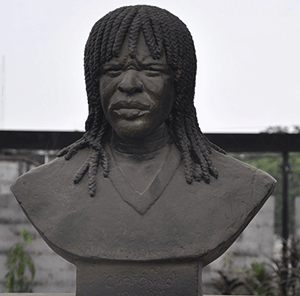Memories of Saturday, August 12, 1989 will continue to linger in the hearts of millions of Nigerians. It was on that hot afternoon that Samuel Sochukwuma Okwaraji slumped and died in active service for Nigeria.
And come Tuesday, August 12, 2014, it will be exactly 25 years after the incident; but the spirit of Okwaraji lives on.
The setting was the main bowl of the National Stadium, Surulere, Lagos. The Green Eagles of Nigeria were up against the Palancas Negras of Angola in the second to the last Group C match in the African zone Italia ’90 World Cup qualifying series.
Having lost 1-2 to Gabon, it was a match that the Green Eagles must win to stay in contention for the World Cup ticket. The Nigerian team actually won the match 1-0 but lost Okwaraji who was the man getting all the media attention.
From the print to the electronic media, the Orlu-born enigmatic soccer star was getting attention because “unlike most African internationals”, writes Emmanuel Maradas, publisher of African Soccer magazine. “Sam Okwaraji came to the Nigerian football from Europe, rather than the other way around. His first club, the Italian first division side, AS Roma, signed him at the age of 20, as the young Okwaraji decided to lay aside a Law degree from the University of Rome and concentrated on professional football.”
Born in 1964 in Orlu, Imo State, South East Nigeria, he left Nigeria in 1982 to study International Law in Italy. Very actively involved in his academic pursuits, he still kept alive his dream of being Nigeria’s “Michel Platini” and “Brazilian Falcao” who were both his soccer role models.
Armed with first and second degree in Law, energetic Okwaraji moved to the old Yugoslavia where he played for Club Dynamo Zaghreb. With a brief stint at Dynamo, the man who spoke Igbo, English, Italian, Spanish, German and Yugoslavian fluently joined Austrian second division club side, Klagenfurt FC.
It was at Klagenfurt that German Stuttgart signed him for six years. Not long into the contract, he was loaned to a second division club, SSV-ULM 1848. He blossomed at ULM to a point that the club could not play without him. “No Okwaraji, no ULM” was the popular slogan then.
Honesty, dedication and accountability were among the invaluable qualities that this gifted lawyer and footballer symbolised. On numerous occasions, he paid his ways to play without asking for refund. Unlike some ‘bench-warmers’ who would hold the whole nation to ransom over inflated flight ticket and arrogantly insult the intelligence of Nigerians on BBC and Voice of America (VOA), he was committed to the service of his fatherland. He was not afraid to put his career on line for his country.
Full of energy, he anchored the Eagles midfield that had Etim “African Maradona” Esim; sensational left winger, Bala Ali; and libero, Stephen Keshi dashing forward to pull down the wall of Berlin erected by the Angolans.
Few minutes into the game, the man with the hairstyle of Rudd Guilt was flashed his first and only yellow card in international soccer for Nigeria.
“Unknown to him and the hissing spectators, the final red card was going to come before the game of death ran its full course,” reported then Concord newspaper’s Dele Momodu (now publisher of the Ovation International magazine).
About 15 minutes to the end of the game, the centre referee sent one of his dangerous Angolan markers off. With the whole stadium watching the red-carded Angolan arguing with the centre referee, fate handed Okwaraji a red card. He slumped on the left side of the field very close to Bala Ali and another Angolan player.
“Before the maddened crowd could return their gaze to the fallen hero, he had disappeared like a meteor,” Momodu reminisced. “He was gone, forever!” Forever was gone Okwaraji, who astonished Nigerian football fans with his amazing skill in his debut for Eagles on January 30, 1988 at Nnamdi Azikwe Stadium, Enugu. Eternally he left after he diligently served his fatherland with his money and talent.
Barely 25 years old at the time death snatched him, he was a great achiever. Credited with one of the fastest goals ever scored in the African Nations Cup finals, Okwaraji had several honorary Man of Match awards in most games that he featured for the Green Eagles.
Twice at Maroc ’88 Nations Cup, he was named Man of the Match. Days before he died, Okwaraji, who was completing his Ph.D thesis, signed a $500,000 contract with Berchem FC of Antwerp, Belgium.
He was a national icon who dreamt big for Nigerian football.
“As someone who came in contact with this football icon, I can say without contradictions that Sam wanted Nigeria to be established as a power in the football world,” former Nigeria Football Association (NFA) chairman, Group Capt. John Obakpolor (rtd.), told sports writers at a forum to mark 12 years remembrance of Okwaraji.
“Not just Africa, but also in the continental world. He wanted a conducive environment created where up-and-coming footballers could express themselves and be recognised. He wanted vibrant, agile, youthful, energetic and resourceful national team in place at all times.
“Although he has left us, Samuel Sochukwuma Okwaraji still lives in our sweet memory. It’s very difficult for the Nigerian public to forget him,” Stephen Keshi summed it up then.
Following his death, a statue was erected in front of the National Stadium, Surulere, to immortalise him.
Players on the Green Eagles side when Okwaraji died were:
• David Ngodigha
• Augustine Eguavoen
• Stephen Keshi
• Sunday Eboigbe
• Obobaifo Osaro (of blessed memory)
• Ademola Adesina
• Uche Okafor (of blessed memory)
• Humphrey Edobor
• Samson Siasia
• Etim Esim
• Dahiru Sadi (Edobor’s substitute in the second half) .




